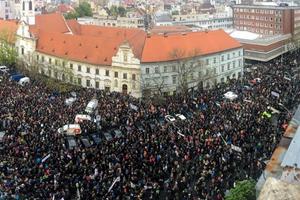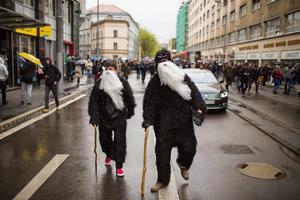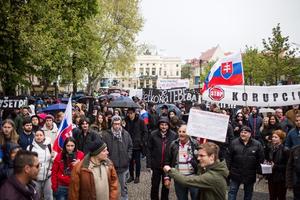Corruption has reached such a level that people should act immediately. The Main symbols of the government’s failure to deal with this problem are special prosecutor Dušan Kováčik, police chief Tibor Gašpar and Interior Minister Robert Kaliňák; and they should resign.
This was the main message of secondary school students Karolína Farská and Dávid Straka who organised an anti-corruption march in Bratislava on April 18.
“Kaliňák to jail, Kaliňák to jail” and “resign, resign” around 5,000 people yelled during their joint speech.
On the same day, organisers stated that the government has two weeks to respond. Yet the government, together with the prosecutor's office and police representatives, have shown little will to accept the protesters’ demands.
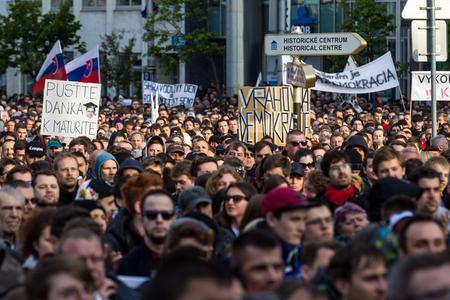
“I am offended by the fact that I should be removed for something I did not participate in; and without any argument or explanation,” Gašpar said during a debate of the private broadcaster TA3.
Protests can be successful if they take place repeatedly and in other regional cities, not only in Bratislava, according to political analysts.
The students stated that they are ready to repeat the protest if the government will not fulfil their demands. They added, however, that they cannot sustain repeated regional protests.
“The problem is that we could not maintain the quality of marches at such a level as it was in Bratislava,” Straka told the Sme daily. “They would probably not take place under our supervision.”
Responses to protest
Though Kováčik has been refusing to respond about the protest since it took place, Prime Minister Robert Fico did comment on the corruption but avoided questions about personnel changes. He stated that it is good when young people are actively interested in the happenings in the country and want to help it through concrete deeds.
He went on to say that the government perceives corruption as a long-term problem and is taking steps to remove it.
Yet Fico and his Smer party have been standing by Kaliňák since the interior minister started facing suspicions that he halted an investigation of businessman Ladislav Bašternák who is now accused of tax fraud.
A politician has to take into consideration that several thousand people demand Kaliňák’s resignation, according to Culture Minister Marek Madarič (Smer),
“However, he must also take into consideration the fact that several tens of thousands, hundreds of thousands of people voted for him,” Madarič said, as quoted by the Denník N daily. “It’s a matter of balance and circumstances.”
Justice Minister of the coalition Most-Híd party, Lucia Žitňanská repeated that Kaliňák should leave.
“It was an expression of something that we all felt,” Žitňanská said about the anti-corruption protest, as quoted by Denník N.
Police Corps President Tibor Gašpar stated that he does not feel the need to resign for any professional failure, adding that he is not personally responsible for investigating corruption offences.
On the other hand, he explained that if Kaliňák decides to dismiss him for political reasons, he will respect it. Moreover, he stated that he will not run for this post again.
“I was thinking about the end anyway due to fatigue syndrome,” Gašpar told pluska.sk news website.
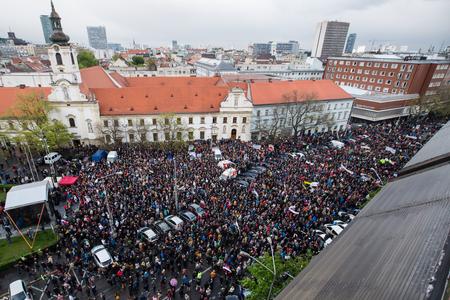
Protest should go further
If the students that organised the anti-corruption protest want to be able to push through their requests, they have to repeat it and march in other cities as well. Sociologist Martin Slosiarik, political scientist Grigoij Mesežnikov and Transparency International Slovakia head Gabriel Šípoš agree that massiveness of protests is what matters.
“If tens thousands of people participated it would be a huge protest by Slovak standards,” Slosiarik told the Sme.
The first protest demanding investigation of Bašternák back in 2016 attracted around 5,000 people. From 3,000 to 4,000 attended the Gorilla protests caused by a leaked, reportedly secret service file named Gorilla describing ties between business tycoons and top politicians.
Despite their numbers not reaching that of the April 18 anti-corruption protest, those protests became well-known because they were not about a single protest, but about a series of protests. There were eight Gorilla protests and a dozen Bašternák protests. This should also happen in current case, according to Slosiarik.
“It shouldn’t be one single event when they come and present their demands,” Slosiarik told the Sme.
The April 18 event was successful but demanding and now organisers are awaiting the government’s reaction to their memorandum. If they decide to continue the anti-corruption marches, it should rather be a challenge to the public so that more mature activists continue with them, according to Straka.
He expresses his fear that future marches could attract extremists.
“Those would turn against us,” Straka told the Sme.



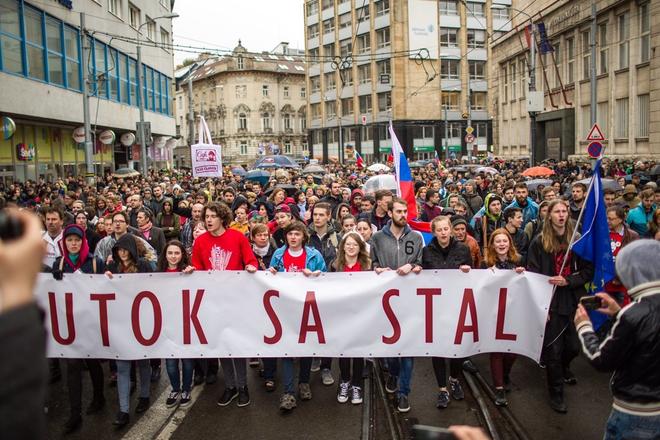 (source: SME)
(source: SME)
